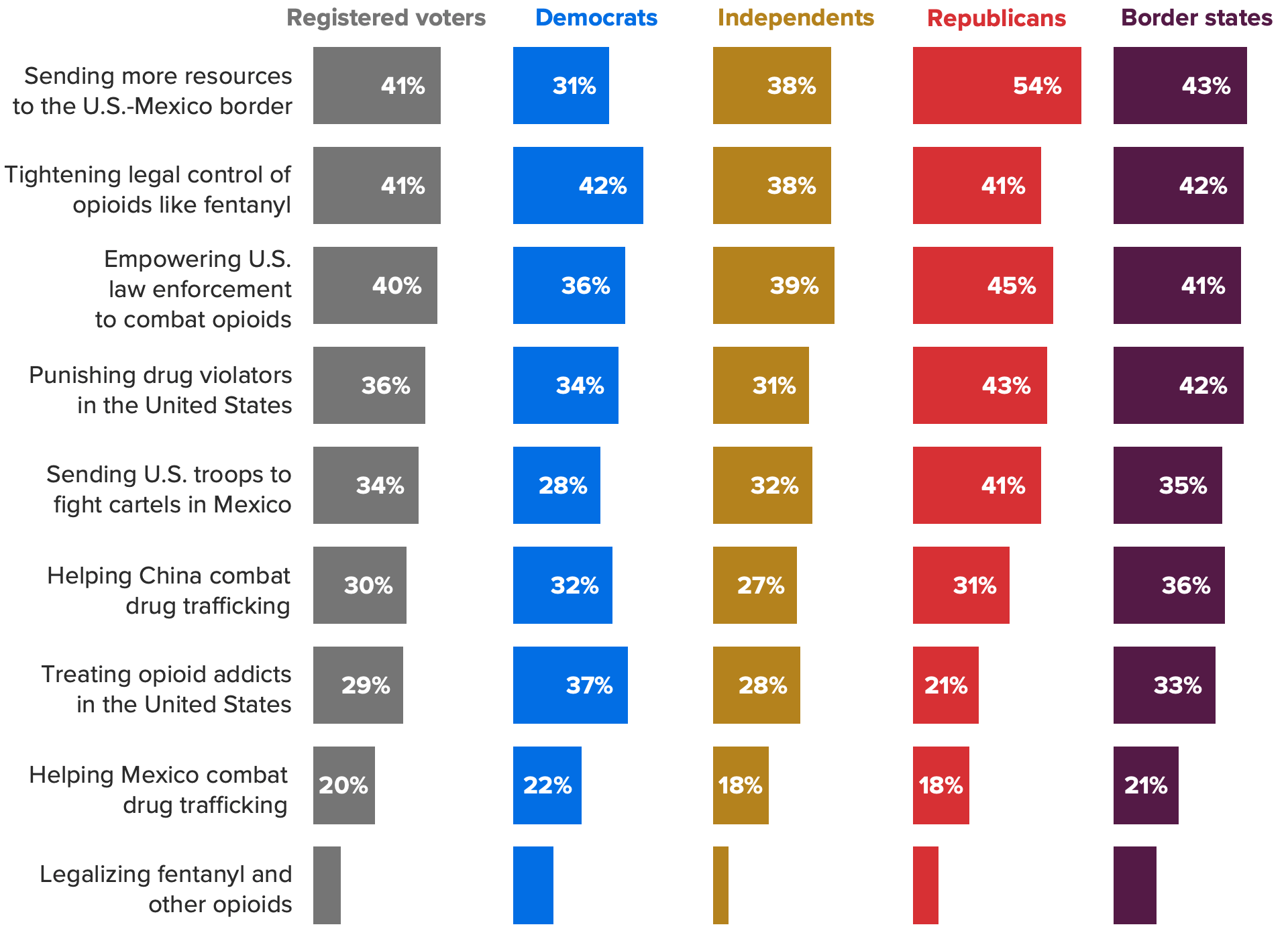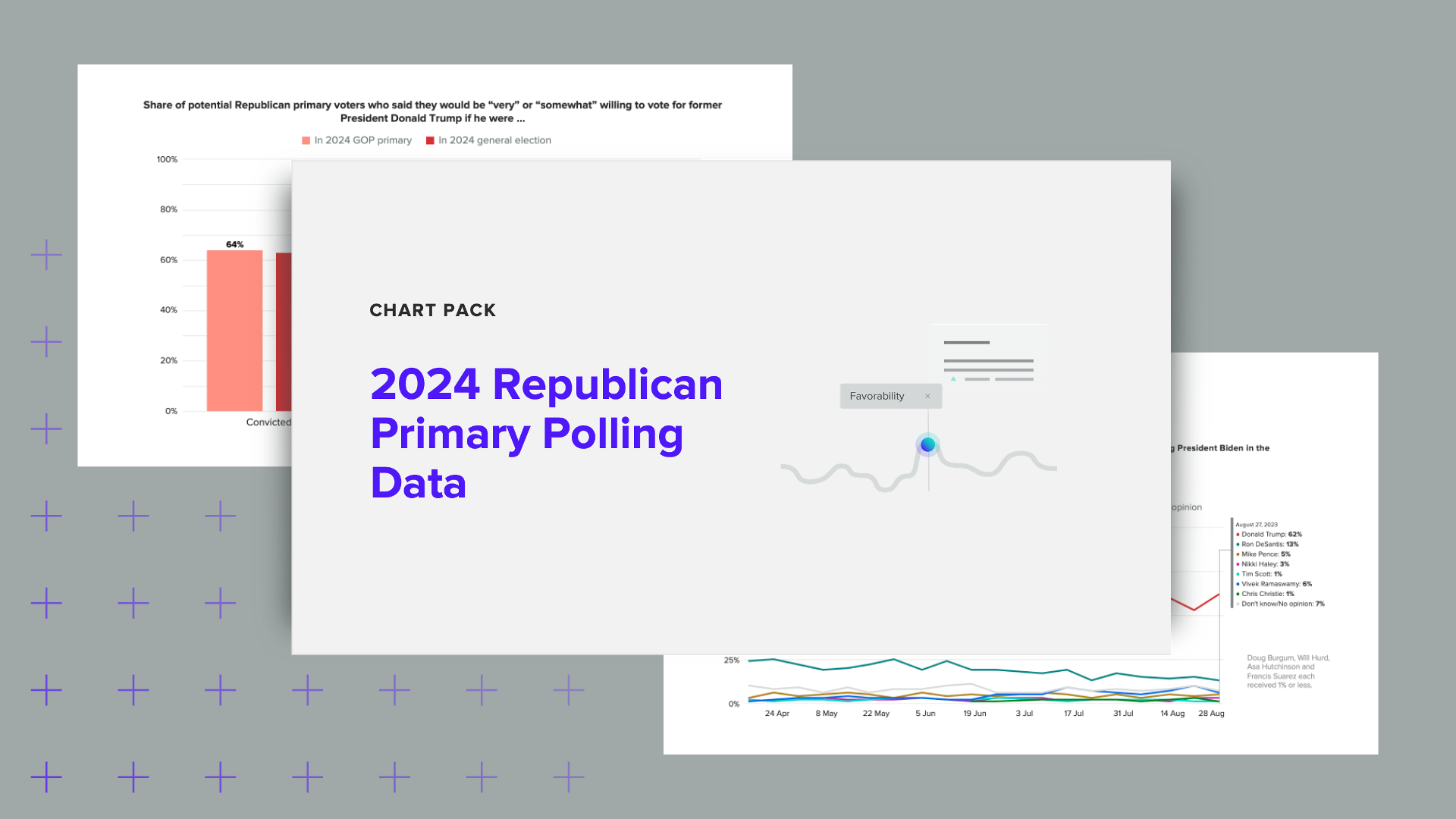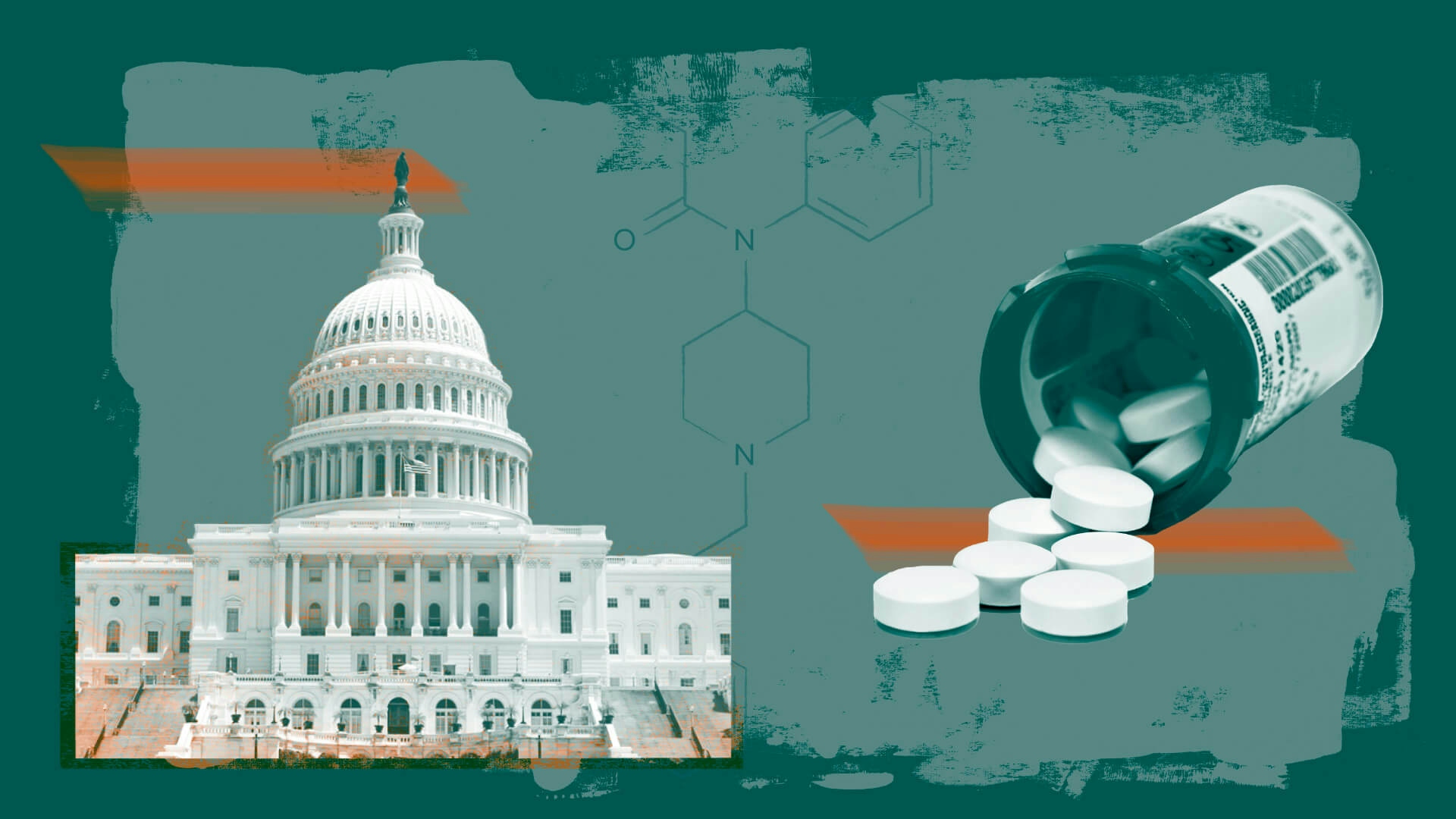Why the Foreign Policy of Fentanyl Will Benefit the GOP Heading Into 2024

Key Takeaways
Americans are dying in large numbers from opioid overdoses involving the synthetic drug fentanyl, much of which comes from China via Mexico, smuggled by drug cartels. Drug trafficking is one of the top foreign policy issues U.S. voters of all stripes care about.
Voters see the opioid crisis as a security issue rather than a health care issue, and mostly blame U.S. drug users and Mexican cartels for its severity. Republicans command more voter trust on security issues, while Democrats do so on health care.
As such, the GOP is leaning heavily on the foreign policy of fentanyl, primarily proposing solutions related to tighter border security or special forces incursions into Mexico. Voters favor such solutions along party lines but agree on tighter control of opioids and domestic law enforcement.
Residents of border states blame the U.S. government for the crisis at much higher rates than other voters do, posing a risk for Democratic candidates in key swing states like Arizona.
For the latest news and analysis on how business, politics and economics intersect around the world, sign up for our daily global news briefing.
The United States is in the midst of the worst drug crisis in its history. Roughly 1,500 Americans die each week from opioid abuse, according to the National Center for Health Statistics, with most of these deaths attributable to overdoses of the synthetic opioid fentanyl. Highly addictive but with a short high, dealers often add fentanyl to other drugs to hook unaware users on the cheap synthetic.
The foreign policy of fentanyl: China and Mexico
The vast majority of all fentanyl in the United States is thought to have traversed the U.S.-Mexico border, mostly hidden in commercial vehicles passing through ports of entry. Chinese labs were the primary source of fentanyl until May 2019, when in cooperation with the U.S. government, China placed the entire class of synthetic opioids that includes fentanyl on a regulatory schedule and cracked down on labs sending parcels of the drug to the United States. China remains the principal (if indirect) source of U.S. fentanyl: Chinese labs now sell fentanyl ingredients to Mexican drug cartels, which then smuggle the drug across the southern border into the United States.
Voters see the opioid crisis as a security issue, not a health care issue
Given the astronomical human cost, it is no surprise that drug trafficking is among the most salient foreign policy issues for U.S. voters.
Drug Trafficking Is Among U.S. Voters’ Top Foreign Policy Issues
U.S. voters most blame Mexican drug cartels and U.S. drug users for the current wave of fentanyl overdoses, followed by Chinese suppliers of fentanyl and its ingredients, providing strong evidence that U.S. voters see the opioid crisis as a security issue rather than a health care issue. Democrats, for their part, blame pharmaceutical companies in higher numbers than other voters. This makes sense: left-leaning narratives have tended to focus on the crisis as a health care issue. Voters who live in states on the U.S.-Mexico border — Arizona, California, New Mexico and Texas — are an interesting subgroup. They are 11 percentage points more likely than all voters to say the U.S. government is to blame for the opioid crisis, but also slightly more likely to blame pharmaceutical companies.
U.S. Adults Say Drug Users and Mexican Cartels Bear the Most Blame for the Opioid Crisis
Why the opioid crisis is a winning issue for the GOP
Since voters place the highest amount of blame on drug users in the United States and on Mexican drug cartels, it appears they view the opioid epidemic primarily as a security issue rather than a health care issue. Voters generally trust the GOP more on security and border issues, while placing more faith in Democrats on health care.
Voters Trust Congressional Republicans More on Immigration and National Security
This helps explain the GOP’s focus on the issue up to this point. In the first Republican debate on Aug. 23, fentanyl was mentioned 12 times. Nine mentions explicitly tied it to Mexican drug cartels, and one tied it to Chinese labs producing fentanyl or its ingredients.
Voters favor solutions along party lines but agree on tighter control of opioids
Republicans are generally much more likely to think that enforcement measures like additional border security (54%), sending U.S. military forces into Mexico to battle cartels (41%) and punishing drug violators (43%) will be effective ways to combat the opioid crisis. Meanwhile, Democrats are 16 percentage points more likely than Republicans to think that treating opioid addicts would help ameliorate the crisis, echoing recent White House actions to treat users and prevent overdoses. However, adults on both sides of the aisle tend to say that tighter legal controls on opioids like those enacted in 2022 are an effective remedy.
Voters Agree on Tighter Control of Opioids but Diverge on Enforcement Versus Treatment

Drug trafficking will be a risk factor for Democratic candidates in border states
For the most part, voters in border states resemble other voters in their views of effective remedies for the opioid crisis. But they are 6 percentage points more likely than the general population to say that punishing drug violators would be an effective disincentive. This tendency toward enforcement, coupled with their frustration with the federal government over the drug epidemic, is a risk factor for Arizona’s Democratic candidates in the upcoming presidential and senate races, and in several competitive house districts along the border that are in play in 2024.
The foreign policy of fentanyl will remain prominent throughout 2024
Evidence from 50-plus years of the war on drugs indicates that this problem is not one to be solved by stemming the supply from a single overseas source. Solutions will be multifaceted and incremental by nature, including measures to address both supply and demand.
Specific demographics at scale: Surveying thousands of consumers around the world every day powers our ability to examine and analyze perceptions and habits of more specific demographics at scale, like those featured here.
Why it matters: Leaders need a better understanding of their audiences when making key decisions. Our comprehensive approach to understanding audience profiles complements the “who” of demographics and the “what” of behavioral data with critical insights and analysis on the “why.”
But given the salience of the issue and the relative credibility of the GOP on immigration and security among U.S. voters, we expect Republican candidates to continue to focus on drug trafficking in general and the foreign policy of fentanyl in particular throughout the primary season and into the general election, and for the issue to continue to resonate with voters on both sides of the aisle, albeit in different ways.
Sonnet Frisbie is the deputy head of political intelligence and leads Morning Consult’s geopolitical risk offering for Europe, the Middle East and Africa. Prior to joining Morning Consult, Sonnet spent over a decade at the U.S. State Department specializing in issues at the intersection of economics, commerce and political risk in Iraq, Central Europe and sub-Saharan Africa. She holds an MPP from the University of Chicago.
Follow her on Twitter @sonnetfrisbie. Interested in connecting with Sonnet to discuss her analysis or for a media engagement or speaking opportunity? Email [email protected].
Related content

3 in 10 Americans Say They Know Someone Affected by Opioid Addiction Amid Surge in U.S. Drug Overdose Deaths

Chart Pack: 2024 Republican Primary Polling Data
